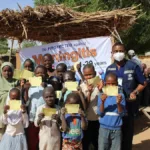Cancer is a leading cause of global death, with the disease claiming nearly 10 million lives as recently as 2020. As clinical and medical experts work to drive enhanced understanding of the disease, its root causes, and the most effective treatments and preventive measures, it is concerning that significant disparities in diagnostic and treatment capacities exist across the world even today.
As it stands, 70% of cancer deaths occur in low-to-middle-income countries. In addition, less than 30% of low-income countries have cancer treatment services available; in comparison, these services are accessible in 90% of high-income countries. It is therefore incumbent on the global community and its leaders to address the gap, empowering action that reduces health inequities to protect people battling cancer.
Pedro Matos Rosa, General Manager at Janssen Gulf, said: “All efforts must strive to decrease the millions of cancer-related deaths each year. We also have responsibility to reduce existing stigmas in a manner that facilitates early cancer detection and intervention. The tremendous burden of cancer calls upon all of us – governments, policymakers, healthcare professionals and individuals worldwide – to take concrete steps in the ongoing battle against cancer.”
As it stands, there is a wealth of research conducted on addressing cancer through pharmaceutical sciences. Over one in three medicines in development are for cancer, and cancer R&D worldwide accounts for 37% of all drugs in preclinical & clinical trials. One in three medicines developed by top pharma companies also seek to address cancer, with the total number of drugs in development for cancer growing by 14.2% since 2019.
“Beating cancer is a journey for humanity, and there is still a high unmet need,” Matos-Rosa said.
Fortunately, cancer treatment landscapes have advanced over time. For example, an improved understanding of breast cancer has enabled the greater personalization of care for patients based on the clinical and pathological molecular characteristics of individual tumors. On the other hand, lung cancer treatment has been transformed through the development of new drugs, and a focus on early screenings.
Also Read: TRANSFORMING CANCER CARE IN THE UAE
Even in the case of Multiple Myeloma (MM), a blood cancer that arises from the plasma cells in the bone marrow, treatment options have progressed. MM is of significant concern both globally and in the UAE, and hematological cancer ranks as the second most prevalent blood cancer, with an annual incidence rate ranging from 3.29 to 4.82 per 100,000 individuals. The disease imposes a significant socioeconomic burden, with an estimated impact of $21.13 billion in the GCC in 2020 (6). Challenges in treating MM, particularly in cases of relapse, underscore the critical importance of timely diagnosis and treatment initiation.
Conclusion
Matos-Rosa added: “Janssen has launched various initiatives to support MM patients in the UAE, including a national campaign to recognize and support advanced practice providers (APPs) caring for MM patients, sponsorship of a multiple myeloma-specific resource center, and collaboration with local health authorities to provide educational resources for MM sufferers while bridging gaps in local support services. We collaborate extensively with healthcare partners, patient advocacy groups and regulatory bodies to enhance MM care. Our vision includes achieving sustained remission, with combining and sequencing therapies to overcome the disease.” In a similar stead, the medical and pharmaceutical community must retain and renew hope to sustain the fight against cancer.




















